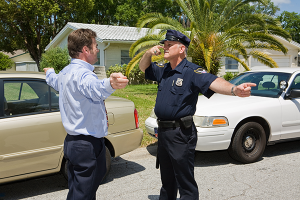Must have Probable Cause in DUI Cases
 At the time of a DUI arrest, the arresting officer must have probable cause in regards to both operation and intoxication in order to make a lawful arrest. If it can be shown that the officer did not, at the time of the arrest, have probable cause to believe that the defendant operated the vehicle while intoxicated, then the arrest was unlawful. However, it is not necessary for the officer to have personally observed the defendant drive the vehicle in order to establish probable cause in regards to operation of the vehicle. Nevertheless, it is important to understand that the officer must have the required probable cause at the time of the arrest and that any evidence obtained after the arrest cannot be used to supply the necessary probable cause.
At the time of a DUI arrest, the arresting officer must have probable cause in regards to both operation and intoxication in order to make a lawful arrest. If it can be shown that the officer did not, at the time of the arrest, have probable cause to believe that the defendant operated the vehicle while intoxicated, then the arrest was unlawful. However, it is not necessary for the officer to have personally observed the defendant drive the vehicle in order to establish probable cause in regards to operation of the vehicle. Nevertheless, it is important to understand that the officer must have the required probable cause at the time of the arrest and that any evidence obtained after the arrest cannot be used to supply the necessary probable cause.
Because an arrest is a more intrusive seizure than an investigatory stop, the probable cause needed for an arrest requires a greater degree of certainty than the articulable suspicion needed for a traffic stop. The suspicion required for an investigatory stop must be elevated to a belief in order to justify an arrest. What that means is that to have probable cause for an arrest without a warrant, a police officer must be aware of reasonably trustworthy facts and information that would lead a reasonable person to believe that the defendant has committed an offense. Probable cause exists when the officer is aware of facts and circumstances which are sufficient to lead a person of ordinary care and prudence to believe that the person being arrested has committed an offense. The totality of the circumstances known to the officer at the time of the arrest may be sufficient to supply the probable cause needed for an arrest.
As indicated above, to make a lawful arrest, an officer must have probable cause for each element of the offense. In drunk driving offenses, the most difficult element for which to establish probable cause is usually the element of intoxication (or being under the influence). Generally, an officer’s observations of slurred speech, difficulty in walking, and an inability to perform certain field sobriety tests constitute sufficient probable cause of intoxication to justify an arrest on a DUI-DWI charge.
The smell of alcohol on a person’s breath, by itself, is not sufficient to establish probable cause in regards to intoxication and is not sufficient to justify an arrest on a DUI-DWI charge. If a defendant was found drinking in a tavern 25 minutes after an automobile accident has occurred is also insufficient to establish probable cause that the defendant was intoxicated at the time of the accident. Finally, probable cause must be established by the facts of the present situation and not be influenced by the defendant’s prior record of drunk or impaired driving offenses.
TeamDUI.com has attorneys near me that are available 24 hours a day. Call 1-844-TEAM-DUI (1-844-832-6384) for a free, no-obligation case evaluation.